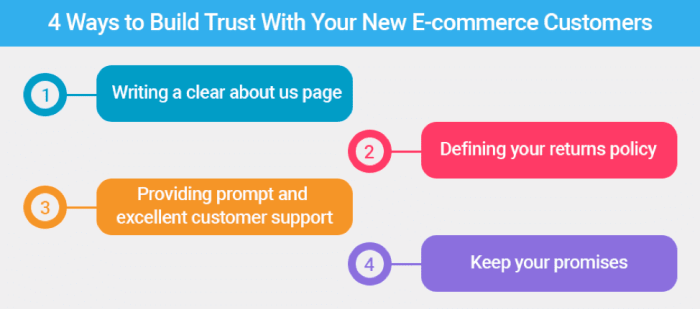Building Customer Trust Online kicks off with a bang, highlighting the importance of trust in the digital world. From strategies to benefits, this topic dives deep into the realm of online trust building.
Importance of Building Customer Trust Online

Building customer trust online is crucial for businesses in today’s digital age. With the increasing number of online transactions and interactions, trust plays a vital role in establishing long-lasting relationships with customers. When customers trust a business, they are more likely to make repeat purchases, recommend the brand to others, and remain loyal over time.
Examples of How Customer Trust Impacts Online Success
- Increased Sales: Customers are more likely to make purchases from a brand they trust, leading to higher sales and revenue.
- Positive Reviews and Referrals: Satisfied customers who trust a business are more likely to leave positive reviews and recommend the brand to friends and family.
- Brand Reputation: Building trust online helps enhance a brand’s reputation and credibility in the eyes of consumers.
Benefits of Establishing Trust with Online Customers
- Customer Loyalty: Trust leads to customer loyalty, with repeat purchases and long-term relationships.
- Competitive Advantage: Businesses that have established trust with their online customers have a competitive edge in the market.
- Reduced Customer Acquisition Costs: Building trust with existing customers can lead to lower customer acquisition costs as satisfied customers are more likely to make repeat purchases.
Strategies for Building Customer Trust Online

Building trust with online customers is crucial for the success of any business. Here are some key strategies to help foster trust and credibility with your online audience:
Consistent Branding Across Platforms
Maintaining a consistent brand image and messaging across all online platforms helps build familiarity and trust with customers. Whether it’s your website, social media profiles, or email communications, consistency is key to establishing credibility.
Transparent Communication
Open and honest communication with customers is essential for building trust online. Be transparent about your products, services, pricing, and any potential issues that may arise. Respond promptly to customer inquiries and feedback to show that you value their input.
Secure Payment Options
Offering secure payment options and displaying trust badges on your website can help reassure customers that their financial information is safe. Implementing SSL encryption and partnering with reputable payment processors can go a long way in building trust with online shoppers.
Customer Reviews and Testimonials, Building Customer Trust Online
Displaying customer reviews and testimonials on your website can provide social proof of your products or services. Encourage satisfied customers to leave feedback and showcase positive reviews to build credibility and trust with potential buyers.
Quality Customer Service
Providing excellent customer service is key to building trust and loyalty with online customers. Respond to inquiries promptly, address any issues or concerns professionally, and go above and beyond to exceed customer expectations. A positive customer service experience can leave a lasting impression and foster trust in your brand.
Personalized Marketing Campaigns
Tailoring your marketing campaigns to individual customer preferences can help build trust and strengthen relationships. Use customer data to create personalized offers, recommendations, and communications that resonate with your target audience, showing that you understand their needs and preferences.
Building Trust through Transparency
Transparency plays a crucial role in building trust online as it allows customers to feel confident in their interactions with a business. By being open, honest, and forthcoming with information, companies can establish credibility and reliability with their audience.
Examples of Transparency Enhancing Customer Trust
- Providing clear and detailed product descriptions, including ingredients, materials, and manufacturing processes.
- Sharing customer reviews and testimonials, both positive and negative, to showcase authenticity.
- Being upfront about pricing, fees, and any additional costs to avoid surprises at checkout.
- Offering a transparent return and refund policy to reassure customers of their purchase.
Guidelines for Maintaining Transparency in Online Interactions
- Be truthful and accurate in all communication, including product claims and advertising.
- Respond promptly and openly to customer inquiries, feedback, and complaints.
- Disclose any potential conflicts of interest, affiliations, or partnerships that may influence content or recommendations.
- Regularly update customers on any changes, updates, or issues that may impact their experience.
Leveraging Customer Reviews and Testimonials
Customer reviews and testimonials play a crucial role in building trust online. They provide social proof and help potential customers feel more confident in choosing a product or service. Businesses can leverage these reviews to establish credibility and strengthen their reputation. Here are some best practices for showcasing customer feedback effectively:
Importance of Customer Reviews
- Customer reviews provide authentic feedback from real users, giving potential customers insights into the quality and performance of a product or service.
- Positive reviews can help build trust and credibility, while negative reviews present opportunities for businesses to address concerns and improve their offerings.
- Having a high volume of positive reviews can boost a business’s reputation and attract more customers.
Showcasing Customer Feedback Effectively
- Display reviews prominently on your website or product pages to make them easily accessible to visitors.
- Use customer testimonials with photos or videos to add authenticity and personal touch to the feedback.
- Respond to reviews, both positive and negative, to show that you value customer feedback and are committed to customer satisfaction.
Enhancing Credibility and Trust
- Encourage satisfied customers to leave reviews by offering incentives or making the process simple and convenient.
- Monitor and manage reviews across different platforms to maintain a positive online reputation.
- Use reviews as a tool for continuous improvement by analyzing feedback trends and making necessary adjustments to products or services.





